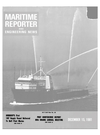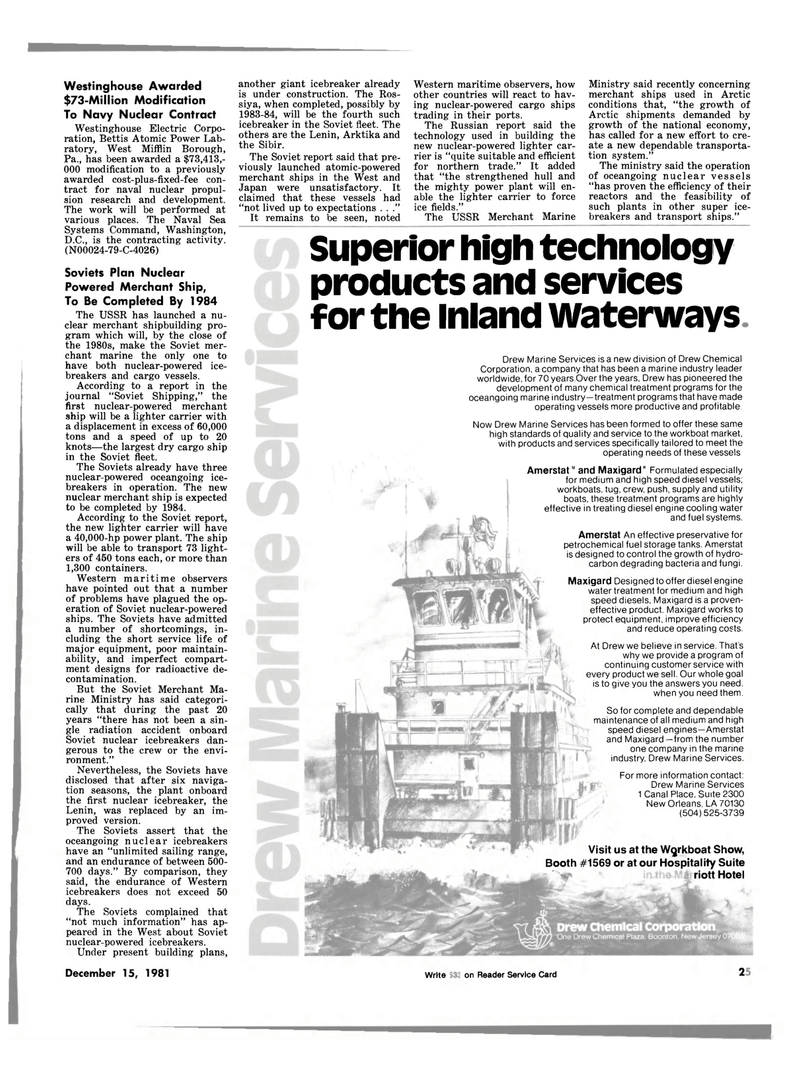
Page 21: of Maritime Reporter Magazine (December 15, 1981)
Read this page in Pdf, Flash or Html5 edition of December 15, 1981 Maritime Reporter Magazine
Westinghouse Awarded $73-Million Modification
To Navy Nuclear Contract
Westinghouse Electric Corpo- ration, Bettis Atomic Power Lab- ratory, West Mifflin Borough,
Pa., has been awarded a $73,413,- 000 modification to a previously awarded cost-plus-fixed-fee con- tract for naval nuclear propul- sion research and development.
The work will be performed at various places. The Naval Sea
Systems Command, Washington,
D.C., is the contracting activity. (N00024-79-C-4026)
Soviets Plan Nuclear
Powered Merchant Ship,
To Be Completed By 1984
The USSR has launched a nu- clear merchant shipbuilding pro- gram which will, by the close of the 1980s, make the Soviet mer- chant marine the only one to have both nuclear-powered ice- breakers and cargo vessels.
According to a report in the journal "Soviet Shipping," the first nuclear-powered merchant ship will be a lighter carrier with a displacement in excess of 60,000 tons and a speed of up to 20 knots—the largest dry cargo ship in the Soviet fleet.
The Soviets already have three nuclear-powered oceangoing ice- breakers in operation. The new nuclear merchant ship is expected to be completed by 1984.
According to the Soviet report, the new lighter carrier will have a 40,000-hp power plant. The ship will be able to transport 73 light- ers of 450 tons each, or more than 1,300 containers.
Western maritime observers have pointed out that a number of problems have plagued the op- eration of Soviet nuclear-powered ships. The Soviets have admitted a number of shortcomings, in- cluding the short service life of major equipment, poor maintain- ability, and imperfect compart- ment designs for radioactive de- contamination.
But the Soviet Merchant Ma- rine Ministry has said categori- cally that during the past 20 years "there has not been a sin- gle radiation accident onboard
Soviet nuclear icebreakers dan- gerous to the crew or the envi- ronment."
Nevertheless, the Soviets have disclosed that after six naviga- tion seasons, the plant onboard the first nuclear icebreaker, the
Lenin, was replaced by an im- proved version.
The Soviets assert that the oceangoing nuclear icebreakers have an "unlimited sailing range, and an endurance of between 500- 700 days." By comparison, they said, the endurance of Western icebreakers does not exceed 50 days.
The Soviets complained that "not much information" has ap- peared in the West about Soviet nuclear-powered icebreakers.
Under present building plans, another giant icebreaker already is under construction. The Ros- siya, when completed, possibly by 1983-84, will be the fourth such icebreaker in the Soviet fleet. The others are the Lenin, Arktika and the Sibir.
The Soviet report said that pre- viously launched atomic-powered merchant ships in the West and
Japan were unsatisfactory. It claimed that these vessels had "not lived up to expectations . . ."
It remains to be seen, noted
Western maritime observers, how other countries will react to hav- ing nuclear-powered cargo ships trading in their ports.
The Russian report said the technology used in building the new nuclear-powered lighter car- rier is "quite suitable and efficient for northern trade." It added that "the strengthened hull and the mighty power plant will en- able the lighter carrier to force ice fields."
The USSR Merchant Marine
Ministry said recently concerning merchant ships used in Arctic conditions that, "the growth of
Arctic shipments demanded by growth of the national economy, has called for a new effort to cre- ate a new dependable transporta- tion system."
The ministry said the operation of oceangoing nuclear vessels "has proven the efficiency of their reactors and the feasibility of such plants in other super ice- breakers and transport ships."
Superior high technology products and services for the inland waterways
Drew Marine Services is a new division of Drew Chemical
Corporation, a company that has been a marine industry leader worldwide, for 70 years,Over the years, Drew has pioneered the development of many chemical treatment programs for the oceangoing marine industry—treatment programs that have made operating vessels more productive and profitable
Now Drew Marine Services has been formed to offer these same high standards of quality and service to the workboat market, with products and services specifically tailored to meet the operating needs of these vessels
AmerstatM and Maxigard" Formulated especially for medium and high speed diesel vessels; workboats, tug, crew, push, supply and utility boats, these treatment programs are highly effective in treating diesel engine cooling water and fuel systems.
Amerstat An effective preservative for petrochemical fuel storage tanks. Amerstat is designed to control the growth of hydro- carbon degrading bacteria and fungi.
So for complete and dependable maintenance of all medium and high speed diesel engines—Amerstat and Maxigard —from the number one company in the marine industry, Drew Marine Services.
For more information contact:
Drew Marine Services 1 Canal Place, Suite 2300
New Orleans, LA 70130 (504) 525-3739
Visit us at the Wgrkboat Show,
Booth #1569 or at our Hospitality Suite riott Hotel
Maxigard Designed to offer diesel engine water treatment for medium and high speed diesels, Maxigard is a proven- effective product. Maxigard works to protect equipment, improve efficiency and reduce operating costs.
At Drew we believe in service. That's why we provide a program of continuing customer service with every product we sell. Our whole goal is to give you the answers you need, when you need them.
December 15, 1981 Write 20fl on Reader Service Card 21

 20
20

 22
22
